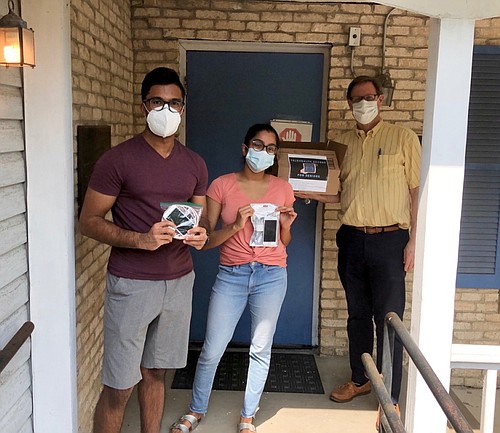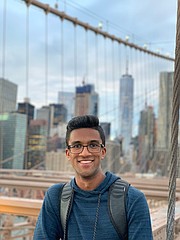When the coronavirus pandemic began to rage in March, schools and colleges were among the first casualties as education officials had to close their doors to ensure safety.
Sasvi Kulasinghe was sent home from her studies at the University of Mary- land. She immediately took an interest in finding out how she could make a tangible impact in her community.
Courtesy Photo
Isuru Herath (Cornell University ’23) co-leads Telehealth in Baltimore with Sasvi Kulasinghe.
“From the news and my own mother, who is a physician, I learned that the transition to telemedicine has been quite difficult for some community members, especially elderly individuals,” Kulasinghe said. “A lot of seniors either have flip phones or phones without video ca- pabilities, which makes telehealth visits much more difficult and less effective. Video conferencing allows the physician to provide more comprehensive care, as they can actually see and evaluate the patients’ symptoms and signs more ef- fectively.
“Thus, when I heard about ‘TeleHealth Access for Seniors,’ I was very eager to join, as it allowed me to address an im- portant need in the community.”
Telehealth for Seniors is a national nonprofit that provides seniors and low- income communities with devices, in- structions, and free tech-support to connect them to their physicians via a mobile device.
Telehealth enables caretakers to virtu- ally screen patients, answer questions, and make treatment recommendations without exposure to a hospital or clinic where they could contract or spread the coronavirus.
Locally, they are donating devices to clinics in the University of Maryland Medical System and the Mobile Medical Care clinic, which serves predominantly low-income communities in need of telemedicine appointments “As we adjust to living in this new re- ality, it has become evident that COVID-19 has exacerbated existing in- equalities. Inner-city communities, as well as the elderly, seem to be the most healthcare to patients in need.” Herath and Kulasinghe agreed that supporting Telehealth for Seniors is es- sential, particularly during COVID-19.
“As we navigate this pandemic, it’s re- ally important that everyone continues to follow social distancing guidelines to keep each other safe,” Kulasinghe said. “By breaking these rules, we may be putting vulnerable populations at high risk without even knowing it. To return to any sense of normalcy, we all have to play our part in protecting each other. It’s more important than ever to be mindful and considerate of others.”
To support our nonprofit’s initiative, donations of used devices are encouraged. To do so, visit “Device Donation Form” at https://www.telehealthforse- niors.org/support-us. Further, monetary donations can be made on the organization’s gofundme vulnerable populations during this pandemic,” said Kulasinghe, the nonprofit’s Baltimore lead.
‘“Telehealth Access for Seniors” is a 501c3 nonprofit organization that was formed to respond to these challenges by donating camera-enabled devices to clinics that serve patients from these populations so they can attend doctor’s appointments virtually. We also provide comprehensive guides and tech-support to help set up and use the devices.”
Isuru Herath, who attends Cornell University and co-leads Telehealth in Baltimore with Kulasinghe, said the organization is a straightforward way to give back to the community, as funds are spent based on the state they are raised in.
Courtesy Photo
Ellicot City resident and sophomore at the University of Maryland, College Park, Sasvi Kulasinghe is the Baltimore lead at TeleHealth Access for Seniors.
“So monetary donations from Mary- land will be used to buy tablets for pa- tients in the Baltimore-DC metropolitan area. Additionally, patients keep these devices, allowing them to connect with their loved ones,” Herath said. “This is especially beneficial for elderly patients, who may often feel isolated during the quarantine. Donating to our organization is a great way to support each other in these trying times and help provide


